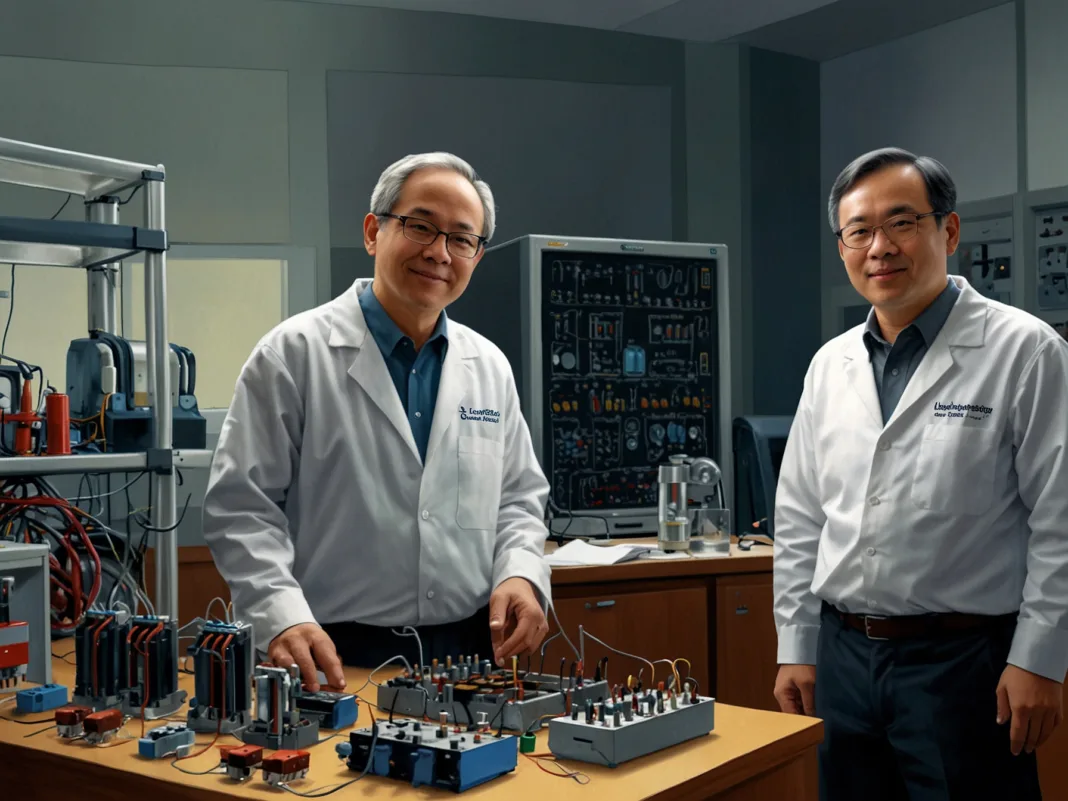In a groundbreaking development that could revolutionize the field of microelectronics, scientists at Lawrence Berkeley National Laboratory and UC Berkeley have engineered a new type of capacitor. Published in the prestigious journal Nature, this research introduces ‘microcapacitors’ that promise to drastically enhance the power density of electronic devices. By employing advanced materials such as hafnium oxide and zirconium oxide, the team has managed to overcome significant limitations that have long plagued conventional capacitors.

© FNEWS.AI – Images created and owned by Fnews.AI, any use beyond the permitted scope requires written consent from Fnews.AI
Capacitors are crucial components in electronic circuits, used to store and release electrical energy. Traditionally, the performance of capacitors has been constrained by their materials and design, limiting their energy storage capacity and integration with other electronic components. However, the advent of these new microcapacitors could signify a substantial leap forward, thanks to their ability to deliver power densities up to 170 times higher than their predecessors.
The researchers utilized thin films of hafnium oxide and zirconium oxide, materials already common in the semiconductor industry, to create these high-performance microcapacitors. This innovative approach not only leverages well-established fabrication techniques but also simplifies the integration process with existing microelectronics manufacturing pipelines. The thin film construction allows for a highly compact design, which is essential for applications requiring miniaturization without compromising on power and performance.

© FNEWS.AI – Images created and owned by Fnews.AI, any use beyond the permitted scope requires written consent from Fnews.AI
What sets these microcapacitors apart is their combination of high energy density and excellent thermal stability, making them ideal for next-generation electronic devices. By fine-tuning the molecular structure of the oxide films, the researchers were able to achieve a significantly higher dielectric constant, a key parameter that directly influences the energy storage capacity of capacitors. This results in capacitors that can store and deliver vast amounts of energy more efficiently, while also being capable of operating under high-temperature conditions without degradation.
Moreover, the use of hafnium oxide and zirconium oxide as dielectric materials addresses several deficiencies of traditional capacitor materials such as silicon dioxide and aluminum oxide. These new materials exhibit lower leakage currents and higher breakdown voltages, further enhancing the overall performance and reliability of the capacitors. Additionally, the compatibility of these oxides with silicon-based processes paves the way for their seamless incorporation into a wide array of electronic devices, ranging from consumer electronics to advanced computing systems.
One of the most exciting aspects of this breakthrough is its potential impact on the development of miniaturized power systems. As electronic devices become smaller and more powerful, the demand for highly efficient and compact power storage solutions has never been greater. These microcapacitors could enable the creation of ultra-compact power modules for portable electronics, medical implants, and even nano-satellites, opening up new possibilities for innovation across multiple industries.
The research team also highlighted the scalability of their fabrication process, which could accelerate the commercialization of these high-density microcapacitors. By utilizing industry-standard materials and techniques, the production of these capacitors can be ramped up without the need for significant changes in existing manufacturing infrastructures. This factor is crucial for their adoption on a large scale, ensuring that the benefits of this technological breakthrough can be swiftly realized.
In addition to the commercial applications, the enhanced performance characteristics of these microcapacitors could have significant implications for research and development in various scientific fields. High-energy-density capacitors are essential for numerous cutting-edge technologies, including quantum computing, advanced sensors, and energy harvesting systems. The ability to deliver compact and efficient power solutions could drive forward research projects that require precise and reliable energy delivery in constrained environments.
The study’s findings also emphasize the importance of interdisciplinary collaboration in achieving such advancements. By combining expertise from materials science, electrical engineering, and semiconductor fabrication, the research team was able to address multiple challenges simultaneously. This collaborative approach underscores the potential for future innovations that arise from bridging different scientific domains and leveraging diverse skill sets.
Looking ahead, the team plans to further explore the properties of hafnium oxide and zirconium oxide films to optimize their performance even further. By experimenting with different compositions and fabrication techniques, they hope to unlock new levels of efficiency and durability for microcapacitors. This ongoing research could potentially lead to even more impressive gains in energy density and device performance, solidifying the role of these innovative capacitors in the future of microelectronics.
In conclusion, the development of microcapacitors with 170 times higher power density represents a major milestone in the field of microelectronics. Through the use of advanced materials and ingenious fabrication methods, scientists at Lawrence Berkeley National Laboratory and UC Berkeley have paved the way for a new era of high-performance electronic devices. As these microcapacitors transition from the research lab to industrial production, their impact on technology and society is poised to be profound.
Was this content helpful to you?





